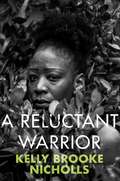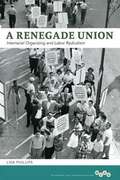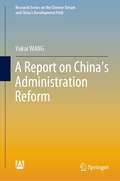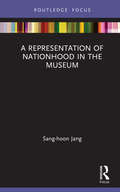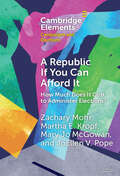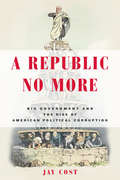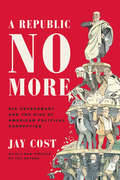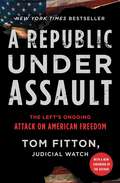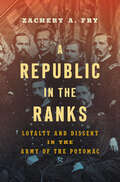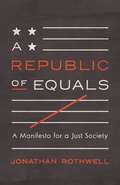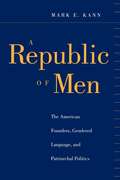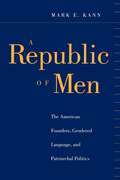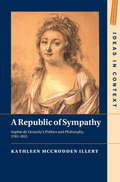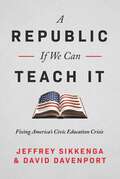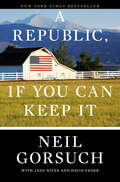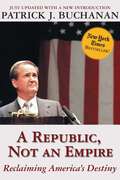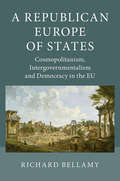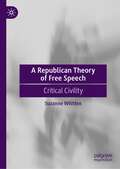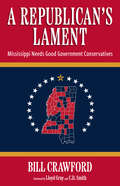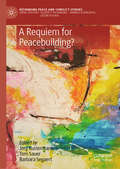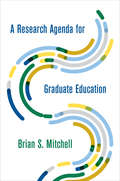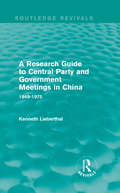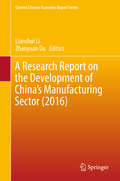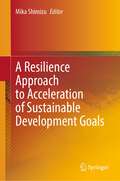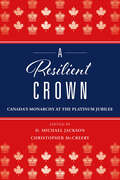- Table View
- List View
A Reluctant Warrior
by Kelly Brooke NichollsA gripping novel that gives readers a rare glimpse into Colombia’s notorious drug wars, told by someone who knows the landscape intimately. When Luzma’s brother Jair unwittingly uncovers the plan by Colombia’s most notorious drug cartel to smuggle an unprecedented cocaine shipment into the US, it puts their family in grave danger. Jair’s kidnapping by the cartel forces Luzma to go face to face with vicious paramilitary leader, El Cubano, and General Ordonez, ruthless head of the military - men who will stop at nothing to protect their empires. But for Luzma, nothing is more important than saving her family - not even her own life. Kelly Brooke Nicholls worked in human rights in Colombia for a number of years. Although the story and characters in A Reluctant Warrior are fictitious, they are based on events she witnessed first hand and her interviews with thousands of victims of paramilitaries, guerrillas and drug cartels. She wrote this book to celebrate and support the brave people in Colombia who risk their lives to protect and make a difference to others.
A Renegade Union: Interracial Organizing and Labor Radicalism
by Lisa PhillipsDedicated to organizing workers from diverse racial, ethnic, and religious backgrounds, many of whom were considered "unorganizable" by other unions, the progressive New York City-based labor union District 65 counted among its 30,000 members retail clerks, office workers, warehouse workers, and wholesale workers. In this book, Lisa Phillips presents a distinctive study of District 65 and its efforts to secure economic equality for minority workers in sales and processing jobs in small, low-end shops and warehouses throughout the city. Phillips shows how organizers fought tirelessly to achieve better hours and higher wages for "unskilled," unrepresented workers and to destigmatize the kind of work they performed. Closely examining the strategies employed by District 65 from the 1930s through the early Cold War years, Phillips assesses the impact of the McCarthy era on the union's quest for economic equality across divisions of race, ethnicity, and skill. Though their stories have been overshadowed by those of auto, steel, and electrical workers who forced American manufacturing giants to unionize, the District 65 workers believed their union provided them with an opportunity to re-value their work, the result of an economy inclining toward fewer manufacturing jobs and more low-wage service and processing jobs. Phillips recounts how District 65 first broke with the CIO over the latter's hostility to left-oriented politics and organizing agendas, then rejoined to facilitate alliances with the NAACP. In telling the story of District 65 and detailing community organizing efforts during the first part of the Cold War and under the AFL-CIO umbrella, A Renegade Union continues to revise the history of the left-led unions of the Congress of Industrial Organizations.
A Report on China’s Administration Reform (Research Series on the Chinese Dream and China’s Development Path)
by Yukai WANGThis book traces the history of China’s administrative reform in the past 35 years, focusing on the three phases of development, four guidelines and five major tasks of the reform since it is of great value to depict the entire process of China’s administrative system reform, analyzing the achievements, problems and prospects of the reform, and exploring experiences and lessons from the relationship between the administrative system reform and China’s economic, social and government transformation.
A Representation of Nationhood in the Museum: The National Museum of Korea (Routledge Research on Museums and Heritage in Asia)
by Sang-hoon JangA Representation of Nationhood in the Museum examines how the National Museum of Korea, as a national repository of material culture and the state’s premier exhibition facility, has shaped and been shaped by Korean nationalism. Exploring the processes by which the museum has discovered and interpreted material culture, using concepts of ethnic nationalism in the historical and political contexts of South Korean society, the book analyses how this nationalist interpretation has regulated South Koreans’ understanding of their material culture. Issues considered include: cultural and political relations with China; Japanese colonial rule, cultural imperialism and its legacy; the division of Korea since 1945; the Korean War and nation building since liberation in 1945; and domestic political upheavals, including military coups in 1961 and in 1979. Demonstrating that authoritarian regimes’ emphasis on the promotion of national unity drove national museums to establish national identity through material culture, Jang argues that international political and diplomatic factors also affect the process of the formation of national identity in a specific political context. Concerning itself with issues such as the relationship between politics and identity, museums and authoritarian regimes, this book should be essential reading for academics, researchers and postgraduate students in museum studies, nationalism studies, Asian studies and history departments.
A Republic If You Can Afford It: How Much Does it Cost to Administer Elections? (Elements in Campaigns and Elections)
by Zachary Mohr Martha Kropf Mary Jo McGowan JoEllen PopeThe cost of administering elections is an importantly understudied area in election science. This book reports election costs in 48 out of 50 states. It discusses the challenges and opportunities of collecting local election costs. The book then presents the wide variation in cost across the country with the lowest spending states spending a little over $2 per voter and the highest spending almost $20 per voter. The amounts being spent in the state are also examined over the election time period of 2008 – 2016. Economic events like the Great Recession had predictable effects on lowering spending on elections but the patterns are not the same across the different regions of the country. The relationship between spending and election administration outcomes is also explored and finds that the voters' confidence and perceptions of fraud in elections is associated with the amount spent on election administration.
A Republic No More
by Jay CostAfter the Constitutional Convention, Benjamin Franklin was asked, "Well, Doctor, what have we got-a Republic or a Monarchy?" Franklin's response: "A Republic-if you can keep it."This book argues: we couldn't keep it.A true republic privileges the common interest above the special interests. To do this, our Constitution established an elaborate system of checks and balances that separates power among the branches of government, and places them in conflict with one another. The Framers believed that this would keep grasping, covetous factions from acquiring enough power to dominate government. Instead, only the people would rule.Proper institutional design is essential to this system. Each branch must manage responsibly the powers it is granted, as well as rebuke the other branches when they go astray. This is where subsequent generations have run into trouble: we have overloaded our government with more power than it can handle. The Constitution's checks and balances have broken down because the institutions created in 1787 cannot exercise responsibly the powers of our sprawling, immense twenty-first century government.The result is the triumph of special interests over the common interest. James Madison called this factionalism. We know it as political corruption.Corruption today is so widespread that our government is not so much a republic, but rather a special interest democracy. Everybody may participate, yes, but the contours of public policy depend not so much on the common good, but rather the push-and-pull of the various interest groups encamped in Washington, DC.
A Republic No More: Big Government and the Rise of American Political Corruption
by Jay CostAfter the Constitutional Convention, Benjamin Franklin was asked, "Well, Doctor, what have we got-a Republic or a Monarchy?" Franklin's response: "A Republic-if you can keep it."This book argues: we couldn't keep it.A true republic privileges the common interest above the special interests. To do this, our Constitution established an elaborate system of checks and balances that disperses power among the branches of government, which it places in conflict with one another. The Framers believed that this would keep grasping, covetous factions from acquiring enough power to dominate government. Instead, only the people would rule.Proper institutional design is essential to this system. Each branch must manage responsibly the powers it is granted, as well as rebuke the other branches when they go astray. This is where subsequent generations have run into trouble: we have overloaded our government with more power than it can handle. The Constitution's checks and balances have broken down because the institutions created in 1787 cannot exercise responsibly the powers of our sprawling, immense twenty-first-century government.The result is the triumph of special interests over the common interest. James Madison called this factionalism. We know it as political corruption.Corruption today is so widespread that our government is not really a republic, but rather a special interest democracy. Everybody may participate, yes, but the contours of public policy depend not so much on the common good, as on the push-and-pull of the various interest groups encamped in Washington, DC.
A Republic Under Assault: The Left's Ongoing Attack on American Freedom (Judicial Watch #3)
by Tom FittonIn this explosive new book, New York Times bestselling author and president of Judicial Watch Tom Fitton explains how the Radical Left and the Deep State are trying to destroy the Trump presidency.Tom Fitton’s first two New York Times bestselling books, The Corruption Chronicles and Clean House, exposed the hypocrisy and corruption of Obama’s two terms. Now, in Fitton’s latest investigative probe, he identifies the four major forces posing a continued threat to American democracy. Deep State Efforts to Destroy the Trump Presidency: How the Democratic National Committee and the Clinton campaign paid for the fraudulent anti-Trump “Steele Dossier,” and how it was used by the Obama FBI and DOJ to dupe the FISA Court to allow it to spy on the Trump presidential campaign AND President Trump. These and more dirty secrets of Obamagate and the impeachment coup attempt are exposed. Hillary Clinton Email Scandal: How the Clinton team and senior officials at the Obama State Department conspired to cover up Hillary Clinton’s secret email system—and shocking revelations that tie the Obama White House to the cover-up! Voter Fraud: How Soros-funded groups attack states that seek to protect clean elections by challenging voter ID laws, and how the Left is cynically peddling COVID-19 crisis electoral “reforms,” such as mail-in voting, which could increase voter fraud and election chaos. And shocking numbers about dirty voting rolls across the nation! Illegal Immigration: How deadly illegal “sanctuary” policies are exploding across America, and how our nation’s sovereignty has been under assault by radical open-border advocates. Subversive Deep State collaborators with ties to the Clinton and Obama machines not only launched countless—often illegal—operations to stop and then remove Trump, but even more alarmingly, are working to transform the United States into something truly unrecognizable to all who believe in liberty and the rule of law. Today one of their main targets is President Donald J. Trump. Tomorrow it could be you and anyone who believes in the US Constitution, believes the United States must have clearly defined and protected borders, believes in the need for a strong military, believes in the value of hard work and faith, and believes in the rule of law and American exceptionalism. <P><P><b>A New York Times Bestseller</b>
A Republic in the Ranks: Loyalty and Dissent in the Army of the Potomac (Civil War America)
by Zachery A. FryThe Army of the Potomac was a hotbed of political activity during the Civil War. As a source of dissent widely understood as a frustration for Abraham Lincoln, its onetime commander, George B. McClellan, even secured the Democratic nomination for president in 1864. But in this comprehensive reassessment of the army's politics, Zachery A. Fry argues that the war was an intense political education for its common soldiers. Fry examines several key crisis points to show how enlisted men developed political awareness that went beyond personal loyalties. By studying the struggle between Republicans and Democrats for political allegiance among the army's rank and file, Fry reveals how captains, majors, and colonels spurred a pro-Republican political awakening among the enlisted men, culminating in the army's resounding Republican voice in state and national elections in 1864.For decades, historians have been content to view the Army of the Potomac primarily through the prism of its general officer corps, portraying it as an arm of the Democratic Party loyal to McClellan's leadership and legacy. Fry, in contrast, shifts the story's emphasis to resurrect the successful efforts of proadministration junior officers who educated their men on the war's political dynamics and laid the groundwork for Lincoln's victory in 1864.
A Republic of Equals: A Manifesto for a Just Society
by Jonathan RothwellWhy political inequality is to blame for economic and social injusticePolitical equality is the most basic tenet of democracy. Yet in America and other democratic nations, those with political power have special access to markets and public services. A Republic of Equals traces the massive income inequality observed in the United States and other rich democracies to politicized markets and avoidable gaps in opportunity—and explains why they are the root cause of what ails democracy today.In this provocative book, economist Jonathan Rothwell draws on the latest empirical evidence from across the social sciences to demonstrate how rich democracies have allowed racial politics and the interests of those at the top to subordinate justice. He looks at the rise of nationalism in Europe and the United States, revealing how this trend overlaps with racial prejudice and is related to mounting frustration with a political status quo that thrives on income inequality and inefficient markets. But economic differences are by no means inevitable. Differences in group status by race and ethnicity are dynamic and have reversed themselves across continents and within countries. Inequalities persist between races in the United States because Black Americans are denied equal access to markets and public services. Meanwhile, elite professional associations carve out privileged market status for their members, leading to compensation in excess of their skills.A Republic of Equals provides a bold new perspective on how to foster greater political and social equality, while moving societies closer to what a true republic should be.
A Republic of Men: The American Founders, Gendered Language, and Patriarchal Politics
by Mark E. KannWhat role did manhood play in early American Politics? In A Republic of Men, Mark E. Kann argues that the American founders aspired to create a "republic of men" but feared that "disorderly men" threatened its birth, health, and longevity. Kann demonstrates how hegemonic norms of manhood–exemplified by "the Family Man," for instance--were deployed as a means of stigmatizing unworthy men, rewarding responsible men with citizenship, and empowering exceptional men with positions of leadership and authority, while excluding women from public life. Kann suggests that the founders committed themselves in theory to the democratic proposition that all men were created free and equal and could not be governed without their own consent, but that they in no way believed that "all men" could be trusted with equal liberty, equal citizenship, or equal authority. The founders developed a "grammar of manhood" to address some difficult questions about public order. Were America's disorderly men qualified for citizenship? Were they likely to recognize manly leaders, consent to their authority, and defer to their wisdom? A Republic of Men compellingly analyzes the ways in which the founders used a rhetoric of manhood to stabilize American politics.
A Republic of Men: The American Founders, Gendered Language, and Patriarchal Politics
by Mark E. KannWhat role did manhood play in early American Politics? In A Republic of Men, Mark E. Kann argues that the American founders aspired to create a "republic of men" but feared that "disorderly men" threatened its birth, health, and longevity. Kann demonstrates how hegemonic norms of manhood–exemplified by "the Family Man," for instance--were deployed as a means of stigmatizing unworthy men, rewarding responsible men with citizenship, and empowering exceptional men with positions of leadership and authority, while excluding women from public life. Kann suggests that the founders committed themselves in theory to the democratic proposition that all men were created free and equal and could not be governed without their own consent, but that they in no way believed that "all men" could be trusted with equal liberty, equal citizenship, or equal authority. The founders developed a "grammar of manhood" to address some difficult questions about public order. Were America's disorderly men qualified for citizenship? Were they likely to recognize manly leaders, consent to their authority, and defer to their wisdom? A Republic of Men compellingly analyzes the ways in which the founders used a rhetoric of manhood to stabilize American politics.
A Republic of Sympathy: Sophie de Grouchy's Politics and Philosophy, 1785–1815 (Ideas in Context)
by Kathleen McCrudden IllertSophie de Grouchy was a political philosopher and activist practising at the centre of Revolutionary events in France between 1789 and 1815. Despite this, her contributions to the development of political thought are often overlooked, with Grouchy commonly falling under the shadow of her husband Nicolas de Caritat, the marquis de Condorcet. A Republic of Sympathy instead situates Grouchy as a significant figure among her contemporaries, offering the first complete exploration of her shifting thought and practice across this period of societal upheaval. Kathleen McCrudden Illert analyses texts newly attributed to Grouchy and examines her intellectual collaborations, demonstrating how Grouchy continued to develop a unique philosophy which placed sympathy as the glue between the individual and the political community. The study also explores Grouchy's connections with her peers and interlocutors, from Adam Smith and Jean-Jacques Rousseau, to Thomas Paine and Jacques Pierre Brissot. In doing so, it argues powerfully for Grouchy's reintegration into the history of European political thought.
A Republic, If We Can Teach It: Fixing America's Civic Education Crisis
by David Davenport Jeffrey SikkengaAmerica faces a crisis in civic education that imperils the long-term health of our country. Too many Americans—especially young people—do not have the knowledge of our history and principles necessary to sustain our republic.Recent national test results reveal the sad state of civic education in our schools. The 2022 report of the National Assessment of Educational Progress showed that only 22 percent of eighth graders tested were &“proficient&” or better in their knowledge of civics, and proficiency in US history dropped to an anemic 13 percent. The Annenberg Policy Center reported in 2019 that only 39 percent of Americans could name the three branches of government, while its 2017 study showed that 37 percent could not name a single right in the First Amendment. How can we &“keep&” a republic, as Benjamin Franklin put it, if we don&’t know what a republic is? At a deeper level, the crisis is not simply about facts and information. If the next generations of Americans do not come to understand that our history and principles are good and that they merit their affection, our experiment in self-government could fail. Action is needed now to reverse the trend.
A Republic, If You Can Keep It
by Neil GorsuchJustice Neil Gorsuch reflects on his journey to the Supreme Court, the role of the judge under our Constitution, and the vital responsibility of each American to keep our republic strong. <P><P>As Benjamin Franklin left the Constitutional Convention, he was reportedly asked what kind of government the founders would propose. He replied, “A republic, if you can keep it.” <P><P>In this book, Justice Neil Gorsuch shares personal reflections, speeches, and essays that focus on the remarkable gift the framers left us in the Constitution. Justice Gorsuch draws on his thirty-year career as a lawyer, teacher, judge, and justice to explore essential aspects our Constitution, its separation of powers, and the liberties it is designed to protect. <P><P>He discusses the role of the judge in our constitutional order, and why he believes that originalism and textualism are the surest guides to interpreting our nation’s founding documents and protecting our freedoms. He explains, too, the importance of affordable access to the courts in realizing the promise of equal justice under law—while highlighting some of the challenges we face on this front today. <P><P>Along the way, Justice Gorsuch reveals some of the events that have shaped his life and outlook, from his upbringing in Colorado to his Supreme Court confirmation process. And he emphasizes the pivotal roles of civic education, civil discourse, and mutual respect in maintaining a healthy republic. <P><P>A Republic, If You Can Keep It offers compelling insights into Justice Gorsuch’s faith in America and its founding documents, his thoughts on our Constitution’s design and the judge’s place within it, and his beliefs about the responsibility each of us shares to sustain our distinctive republic of, by, and for “We the People.” <P><P><b>A New York Times Bestseller</b>
A Republic, Not an Empire: Reclaiming America's Destiny
by Patrick J. BuchananA Republic, Not an Empire: Reclaiming America's Destiny by Patrick J. Buchanan
A Republican Europe of States: Cosmopolitanism, Intergovernmentalism and Democracy in the EU
by Richard BellamyCombining international political theory and EU studies, Richard Bellamy provides an original account of the democratic legitimacy of international organisations. He proposes a new interpretation of the EU's democratic failings and how they might be addressed. Drawing on the republican theory of freedom as non-domination, Bellamy proposes a way to combine national popular sovereignty with the pursuit of fair and equitable relations of non-domination among states and their citizens. Applying this approach to the EU, Bellamy shows that its democratic failings lie not with the democratic deficit at the EU level but with a democratic disconnect at the member state level. Rather than shifting democratic authority to the European Parliament, this book argues that the EU needs to reconnect with the different 'demoi' of the member states by empowering national parliaments in the EU policy-making process.
A Republican Theory of Free Speech: Critical Civility
by Suzanne WhittenThis book offers the first comprehensive philosophical examination of the free speech ‘battles’ of the last decade, arguing for a critical republican conception of civility as an explanatory and prescriptive solution. Issues such as no-platforming and safe spaces, the increasing influence of Far-Right rhetoric on internet forums, the role of Twitter as a site of activist struggles, and the moral panics that surround ill-judged comments made by public figures, all provide a new set of challenges for society which demand a careful critical analysis. The author proposes a 'republican theory' of free speech, demonstrating how a conception of ‘critical’ civility, one which combines the importance of expressive respect with the responsibilities of contestation and vigilance, is required if we are to combat some of the most contentious speech-related conflicts facing contemporary society today.
A Republican's Lament: Mississippi Needs Good Government Conservatives
by Bill CrawfordBill Crawford thought his modern-day Republican Party would lift Mississippi off the bottom, a notion born of Gil Carmichael’s vision for good government conservatism. A Republican’s Lament tells of Crawford’s dedicated efforts to implement Carmichael’s vision, his keen observations of Mississippi’s struggles, and his critical commentaries over the past half century.For more than fifty years, few people have had a better view or a wider variety of roles in the ups and downs of Mississippi and its communities than Crawford. The Canton native has been a daily newspaper reporter, a crusading small-town weekly editor, a Republican Party leader, a reform-minded Republican state representative, an influential Institutions of Higher Learning board trustee, a successful banker, a community college administrator, a state economic development official, a community development leader and nonprofit founder, a mentor of developing community leaders, and a syndicated political columnist. From Gil Carmichael's vision for good government and Haley Barbour’s pragmatic conservatism to starve the beast and truth management politics, poverty and the Cycle of Prosperity, Faulkner’s curse and other behavioral shadows, the Ayers case, and more, Crawford weaves a unique and eventful story about his home state’s enduring dilemmas and a clarion call for its better possibilities.
A Requiem for Peacebuilding? (Rethinking Peace and Conflict Studies)
by Barbara Segaert Jorg Kustermans Tom SauerThis book assesses the claim that peacebuilding is a moribund international practice. Its contributors trace the origins of peacebuilding, bring back to memory its moments of triumph, and reflect on the reports of its decline. The story of peacebuilding parallels the broader story of liberalism’s rise and fall in world politics, including the attempt to remedy an ailing patient by administering a magic medicine – “the local turn”. Its contributors further write about what may come after peacebuilding as we still know it. They describe more locally rooted attempts at building peace and how they operate in the shadows of, and in an ambiguous relationship with, governmental and international peacebuilders. The book finally suggests that reports of the pending death of peacebuilding are probably premature. Peacebuilding is a resilient international practice, apt to adjust itself to a changing environment, and too important a source of legitimacy for those that wield power.
A Research Agenda for Graduate Education
by Brian S. MitchellPost-baccalaureate education continues to expand at an accelerated rate as new degree programs are developed, enrollments rise, online instruction matures, and the number of institutions offering advanced degrees increases. Our level of understanding of graduate and professional education has not kept pace, especially in comparison to the depth of scholarship available on primary, secondary, and baccalaureate education. A Research Agenda for Graduate Education is a call to action for the graduate education community to commit to the same level of research and scholarship on itself that it expects from its students in their own disciplinary training. In this book, Brian S. Mitchell explores the current literature on graduate education for theoretical models that need testing, previous research that needs updating, and future research that may be explored. The book is divided into research questions on the science of graduate learning, graduate student career preparation, and graduate program improvement, with special attention placed on current research topics. Targeted at higher education researchers, including educational psychologists and disciplinary-based researchers specializing in graduate education, this volume will also be of interest to funding agencies, university administrators, and faculty mentors.
A Research Guide to Central Party and Government Meetings in China: 1949-1975 (Routledge Revivals)
by Kenneth LieberthalOriginally published in 1976, Lieberthal collated notes from Central Party, government and military meetings on a national level in China between 1949 and 1975 to create this guide to Chinese policymaking. This guide provides insight into issues such as the representation of important meetings in the media, how policies are made and how policy-making in China has varied over time. This title will be of interest to students of Asian Studies and International Politics.
A Research Report on the Development of China’s Manufacturing Sector (Current Chinese Economic Report Series)
by Lianshui Li Zhanyuan DuThis book investigates key developments in China's manufacturing industry from the perspectives of general evaluation, regional analysis, industrial analysis and enterprise analysis. Based on data for 1978 to 2013, it details the characteristics of the different stages, typical development patterns, and the international status of China's manufacturing sector. It also provides an in-depth portrait of China's new-type manufacturing sector based on four main aspects, namely, economic creativity, technological innovation capability, energy conservation capability, and environmental protection capability, and subsequently assesses the status quo of this sector, analyzes the regional development characteristics, and ranks China's top 10 provinces and top 10 cities in terms of manufacturing. The book outlines the industrial characteristics of China's manufacturing sector and analyzes the factors influencing its development and lastly, it examines China's listed manufacturing enterprises, ranking and providing brief snapshots of the top 50 most respected enterprises. This book is intended for all those interested in the development of China's manufacturing sector, especially university instructors and students, governmental officials and managerial personnel in the manufacturing sector and related enterprises.
A Resilience Approach to Acceleration of Sustainable Development Goals
by Mika ShimizuThis is the first book to articulate how to address interlinkages among sustainable development goals (SDGs), which are keys to implementing those goals by 2030. At the heart of the book is a resilience approach to the enabling relevant systems, practices, and education and research. While SDGs are well known at different levels from local to global spheres, a major gap can be seen between goals and approaches, as approaches are lacking for addressing interlinkages among SDGs. The United Nations General Assembly in 2015 acknowledged interlinkages as being of crucial importance in ensuring the purpose of the goals. However, few actual approaches have been specified to address the interlinkages or interconnections at both the policy and practical levels. Thus, it is urgent to face the question of how to address the interlinkages by stakeholders—not only policy communities and researchers but also practitioners and students, especially innovators who can go beyond existing boundaries. By highlighting that challenge, this book lays out a path for addressing interlinkages among SDGs by applying a resilience approach to the issues of a sustainable society. The resilience approach has been developed from combinations of different modes of thinking and practices, including the systems approach, systems and design thinking, and resilience thinking and practices. Based on this overarching approach, innovators seek out the relevance of that approach to their SDGs-related practices at the system, local, and educational levels. The book therefore serves as a guide to how the resilience approach can contribute to accelerating implementation of SDGs by 2030.
A Resilient Crown: Canada's Monarchy at the Platinum Jubilee
by D. Michael JacksonAs the Queen marks seventy years on the throne, this engaging work examines Canada’s constitutional monarchy. As Queen Elizabeth II celebrates her Platinum Jubilee in 2022 and nears the conclusion of her reign, much discussion and debate has taken place about the monarchy in Canada.A Resilient Crown examines a broad range of issues related to Canada’s constitutional monarchy, its present state, and its future. Topics include Crown-Indigenous relations; the foundational place of the Crown in Canada’s system of government; the viceregal offices and the role of the administrator; the Crown and francophone Canada; the prime ministers and the Queen; royal tours; and Queen Elizabeth herself.Drawing from academics, serving and retired public servants, and well-known commentators, this book brings together a rich collection of essays that delve into the Crown in Canada today.
